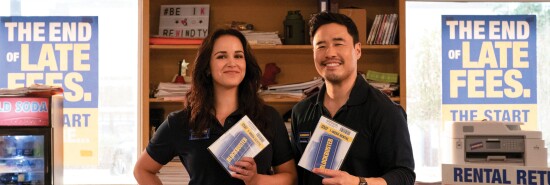
Netflix’s kind rewind on Blockbuster
Graham Hillard
“Isn’t it ironic,” a character in the new Netflix series Blockbuster asks, “that our small business taking a stand against a big corporation … is actually a franchise of a once-huge corporation?” Indeed it is. And isn’t it ironic that the point is being made not only with the blessing of the “big corporation” in question, but to its actual real-world profit?
Paradoxes of this kind abound on Netflix’s latest, a half-hour sitcom set in the last Blockbuster Video store in America. A product of our era of isolation, Blockbuster recognizes the irreplaceability of human community. As light as microwave popcorn, it has an eye on the economics of disruption and the way such turmoil plays out in real people’s lives.
To be sure, the Blockbuster versus Netflix saga of the early 2000s is a fascinating tale of woe. Having declined, 22 years ago, to purchase its online competitor for a trivial $50 million, Blockbuster soon discovered that its brick-and-mortar model was unsustainable in the digital age. As I write these words, Netflix’s market capitalization is a cool $116 billion, while Blockbuster LLC endures mostly as a memory. There is, to nostalgists’ delight, a true last-remaining Blockbuster location in Bend, Oregon — the home, presumably, of an army of internet refuseniks. A documentary chronicling that store’s fight for survival is currently streaming on (you guessed it) Netflix.
Had Blockbuster thought to explore some of this history, it might have gone down as the smartest sitcom of the year, a sunny counterpoint to Apple TV+’s hugely underrated dramedy WeCrashed. Instead, the series is a sweetly forgettable dainty, a comedy of manners that misses as often as it hits and is only just witty enough to keep the audience tuned in.
The show stars Randall Park as Timmy Yoon, the store’s owner and Blockbuster’s answer to The Office’s Michael Scott. Like Steve Carell’s famous creation, Timmy is an object of fun precisely because of his tragicomic naivete. Pressing a film recommendation on an ambivalent shopper, Timmy assures the man that he has been working in the rental business “since the seventh grade.” Overhearing the boast, an employee speaks on behalf of erstwhile Blockbuster jocks the world over (including this reviewer): “That is not the flex you think it is.”
Joining Timmy on the “floor” are three generations of misfits whom one struggles to imagine working elsewhere. Carlos Herrera (Tyler Alvarez) is a Generation Z film nerd for whom video-store employment is but a step on the road to becoming the next Quentin Tarantino. Eccentric Hannah Hadman (Madeleine Arthur) is such a penny-pincher that she waters down a half-empty jar of peanut butter for a snack. At the other end of the age range is the droll Connie Serrano (a very funny Olga Merediz), whose attachment to her position approaches the obsessive. In one of the series’s best scenes, Connie reflects upon how she filled her days before launching a retail career: “I got catfished a bunch, of course, swatted myself more than once, [and] was hooked on nasal sprays for a piece.” Uproarious material? Not really. But I challenge anyone not to laugh at the delivery.
Like The Office, Blockbuster mingles the humorously absurd with the wistfully heartfelt. The latter proceeds mainly from the character of Eliza Walker (Melissa Fumero), who, along with Timmy, represents the generation straddling the Carlos-Connie divide. A divorced mother who once did a semester at Harvard University, Eliza is exactly the sort of person who shouldn’t be working at a video-rental store but must. In Blockbuster’s America, the recession has arrived early, and even menial jobs seem hard to come by. Juggling work, a teenage daughter, and Timmy’s obvious crush, Eliza serves as an avatar of the underemployed millions, some number of whom have passed through my own classroom over the years before taking positions that were clearly beneath them.
This is not to say, thankfully, that Blockbuster exists to deliver political zingers. It is, however, a show that dips its feet in recognizable economic waters. In one early subplot, Timmy must decide which of his employees to fire, a choice that occasions real soul-searching. In another, our protagonist must negotiate terms with his friend and landlord, Percy Scott (Curb Your Enthusiasm’s J. B. Smoove, keeping it surprisingly clean). The upshot of this balancing act is that the series is clear-eyed but not hectoring, awake but not woke. It isn’t the funniest show ever made, but it is amusing, well cast, and briskly paced. It is also, as many have remarked, an exercise in nostalgia that will appeal to a number of viewers on that basis alone. Streaming it, I briefly yearned to be 16, broke, and carefree once again.
What other “defunct-franchise” comedies might follow if Blockbuster succeeds? Circuit City? Dressbarn? Linens ’n Things? The possibilities are endless. Kudos to Netflix and creator Vanessa Ramos for getting there first. If there’s a second season in the offing, I’ll (probably) be watching.
Graham Hillard is the author of Wolf Intervals (Poiema Poetry Series) and a Washington Examiner magazine contributing writer.
